 Much has been made of what have been reported as poor results at BskyB (Profits announced on Friday 4 Nov 05 saw a pre-tax rise of 13.6% to £200m), intense competition is given as the cause of the lower than hoped for growth in subscribers.
Much has been made of what have been reported as poor results at BskyB (Profits announced on Friday 4 Nov 05 saw a pre-tax rise of 13.6% to £200m), intense competition is given as the cause of the lower than hoped for growth in subscribers.
The competition is attributed to the steady increase in Freeview penetration but where is the much trumpeted BBC free satellite offering, they labeled FreeSat?
Speaking recently with an NDS insider it was brought to my attention that this new ‘platform’ could be something of an empty threat. This must, of course been judged through the knowledge that NDS is the TV conditional access subscriber technology company used by Bskyb.
Even bearing this in mind, we felt it was worth asking ourselves a few questions about how it would work, who would view it and what would be its purpose:
How would it work?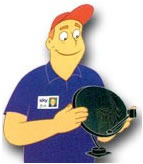 Most would consider a UK satellite rival needs to be positioned to use the same satellites as Sky services that’s Eurobird and Astra 2. If you move away from their orbital positions, you’re going to have to duplicate a whole load of services across two platforms with the expense that will entail.
Most would consider a UK satellite rival needs to be positioned to use the same satellites as Sky services that’s Eurobird and Astra 2. If you move away from their orbital positions, you’re going to have to duplicate a whole load of services across two platforms with the expense that will entail.
Who would view it?
Presumably the target audience are those who want Freeview but aren’t currently served. Freeview coverage is growing steadily and a Satellite installation is always going to be more costly than a terrestrial one, so I reckon numbers here will be limited.
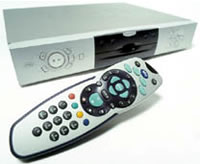 The other group that would be interested are the ‘churn’ which are now reported by Sky as around 11%. These are subscribers who are leaving their Bskyb packages – but they’re really already on the Sky Freesat as unless someone comes and takes away their Set- top-box and mini-dish. They’ll get many of the FTA (Free To Air) services like ITV3 that aren’t available on analogue terrestrial and, for a small charge, can obtain a viewing card that will allow them to view those encrypted services like Channel 5, Channel 4, ITV1 and ITV2.
The other group that would be interested are the ‘churn’ which are now reported by Sky as around 11%. These are subscribers who are leaving their Bskyb packages – but they’re really already on the Sky Freesat as unless someone comes and takes away their Set- top-box and mini-dish. They’ll get many of the FTA (Free To Air) services like ITV3 that aren’t available on analogue terrestrial and, for a small charge, can obtain a viewing card that will allow them to view those encrypted services like Channel 5, Channel 4, ITV1 and ITV2.
So what’s the purpose?
It seems to me that one purpose of the BBC floating the idea of FreeSat is as a spoiler to Bskyb. To perhaps deter those at the margin from signing up and also to increase the traditional broadcasters negotiating position when speaking to Sky.
With the promise of Satellite delivered HDTV in 2006, the continuing growth of Sky+ and the strategic takeover of Easynet, Sky still looks to know where it’s going. Given time and with the right marketing by Sky, many ‘Free-viewers’ will trade up to a Sky package that fits their requirement.
Long term, as long as Bskyb retains its hunger for subscribers, and continues to secure content that viewers wish for, I’d back it against ITV and the cable companies, with or without a new BBC sponsored Satellite version of Freeview.
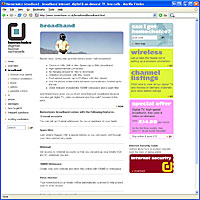 The wires are hot with rumours that BSkyB is contemplating a bout of wad waving in the direction of the video-on-demand, broadband and telephone company Homechoice, which is reportedly finding things tres tricky in the increasingly competitive TV broadband market.
The wires are hot with rumours that BSkyB is contemplating a bout of wad waving in the direction of the video-on-demand, broadband and telephone company Homechoice, which is reportedly finding things tres tricky in the increasingly competitive TV broadband market. Homechoice currently provides a broadband Internet and telephone service, with on-demand programmes covering comedy, drama, music soaps, pay-per-view movies and home shopping.
Homechoice currently provides a broadband Internet and telephone service, with on-demand programmes covering comedy, drama, music soaps, pay-per-view movies and home shopping. City analysts, however, suspect that Sky could snap up the company as part of its plans for video-on-demand and broadband.
City analysts, however, suspect that Sky could snap up the company as part of its plans for video-on-demand and broadband.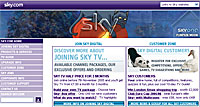 Vodafone UK and British Sky Broadcasting (Sky) have announced an agreement to launch Sky Mobile TV, the UK’s first commercially available mobile TV service available on a wide range of handsets, as we
Vodafone UK and British Sky Broadcasting (Sky) have announced an agreement to launch Sky Mobile TV, the UK’s first commercially available mobile TV service available on a wide range of handsets, as we  The deal looks set to turbo-boost adoption of entertainment and information services to mobile phones, with users able to enjoy TV programmes on the move with access to live breaking news and sports reports from Sky News and Sky Sports News.
The deal looks set to turbo-boost adoption of entertainment and information services to mobile phones, with users able to enjoy TV programmes on the move with access to live breaking news and sports reports from Sky News and Sky Sports News.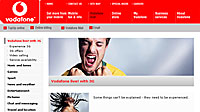 The Sky Mobile TV pack will be provided free of charge (subject to Vodafone customer fair usage policy) until the end of January 2006, with customers being charged £5.00 (~$8.90, €7.38) per month for each of the Sky Mobile TV packs subscribed to thereafter,
The Sky Mobile TV pack will be provided free of charge (subject to Vodafone customer fair usage policy) until the end of January 2006, with customers being charged £5.00 (~$8.90, €7.38) per month for each of the Sky Mobile TV packs subscribed to thereafter, Additional mobile channels are likely to sign up to the Sky Mobile TV service over the coming months.
Additional mobile channels are likely to sign up to the Sky Mobile TV service over the coming months. BSkyB’s Director of Product Management, Gerry O’Sullivan couldn’t help sounding smug as he took centre stage at The Connected Home conference in London today.
BSkyB’s Director of Product Management, Gerry O’Sullivan couldn’t help sounding smug as he took centre stage at The Connected Home conference in London today. While Microsoft’s Cynthia Crossley and Telewest’s Mark Horley nodded collaboratively to Merlin Kister of Intel’s assertion that “We mustn’t be close minded and pick a winner. It’s important for all players to work together,” O’Sullivan looked disinterested.
While Microsoft’s Cynthia Crossley and Telewest’s Mark Horley nodded collaboratively to Merlin Kister of Intel’s assertion that “We mustn’t be close minded and pick a winner. It’s important for all players to work together,” O’Sullivan looked disinterested. “There’s zero tolerance (among our customers) for that sort of unreliability and pain…we can only roll out products that you switch on and they work.”
“There’s zero tolerance (among our customers) for that sort of unreliability and pain…we can only roll out products that you switch on and they work.” Horley mentioned that Telewest was launching its own 160GB PVR in early 2006, with the WHOLE disc available for recording “as we already offer video on demand”.
Horley mentioned that Telewest was launching its own 160GB PVR in early 2006, with the WHOLE disc available for recording “as we already offer video on demand”.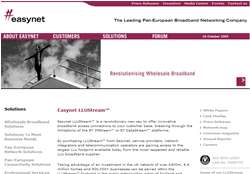 As we reported last week, Easynet has been bought by Sky – as long as they get shareholder approval, but since Sky have offered a premium on Easynet’s shares, this should be a done deal.
As we reported last week, Easynet has been bought by Sky – as long as they get shareholder approval, but since Sky have offered a premium on Easynet’s shares, this should be a done deal. Even though Sky are buying into LLU, Easynet only cover around 250 exchanges and currently all the voice goes to BT (Easynet use the shared metallic path LLU option), while Sky are likely to want to take the phone service as well (they already have a SkyTalk package using CPS provided by THUS). Sky will need to invest to make this a reality as well as increasing Easynet’s coverage. They have said they want to go into around 1000 exchanges, so that’s a build out of around 750 – which won’t be cheap (probably another £100m’ish at least).
Even though Sky are buying into LLU, Easynet only cover around 250 exchanges and currently all the voice goes to BT (Easynet use the shared metallic path LLU option), while Sky are likely to want to take the phone service as well (they already have a SkyTalk package using CPS provided by THUS). Sky will need to invest to make this a reality as well as increasing Easynet’s coverage. They have said they want to go into around 1000 exchanges, so that’s a build out of around 750 – which won’t be cheap (probably another £100m’ish at least). If all the LLU players aggregated infrastructure and competed on services, they could build a 21CN of their own now. LLU competition is going to be fiercely competitive with Wanadoo, AOL, Sky and even Be offering a triple-play – all competing for the same customers. – as well as BT (who will have nationwide coverage) and not ignoring NTL/Telewest who are also going into LLU.
If all the LLU players aggregated infrastructure and competed on services, they could build a 21CN of their own now. LLU competition is going to be fiercely competitive with Wanadoo, AOL, Sky and even Be offering a triple-play – all competing for the same customers. – as well as BT (who will have nationwide coverage) and not ignoring NTL/Telewest who are also going into LLU.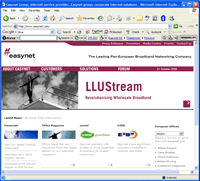 Sky will gain income from broadband subscription and possibly entice further subscribers to their TV service taking them to their stated aim of 10m. Far more important is a new channel to deliver content through – one they have total control over. They like that.
Sky will gain income from broadband subscription and possibly entice further subscribers to their TV service taking them to their stated aim of 10m. Far more important is a new channel to deliver content through – one they have total control over. They like that.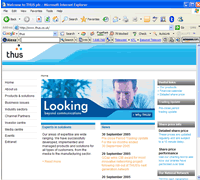 Sky are also in an odd position as they’ll probably utilise MPEG-4 as the coding system, which means they’ll have to modify (or supplement) their existing transmission systems which are all based on MPEG-2. They’ll also have to introduce a new IP based set-top-box. However they’ll have to be carefull as to not make it too feature rich compared to existing STB’s used to decode the satellite transmissions or existing users will want to migrate to the broadband version – which will cost Sky a huge ammount as the exisitng boxes are considerably subsidised.
Sky are also in an odd position as they’ll probably utilise MPEG-4 as the coding system, which means they’ll have to modify (or supplement) their existing transmission systems which are all based on MPEG-2. They’ll also have to introduce a new IP based set-top-box. However they’ll have to be carefull as to not make it too feature rich compared to existing STB’s used to decode the satellite transmissions or existing users will want to migrate to the broadband version – which will cost Sky a huge ammount as the exisitng boxes are considerably subsidised.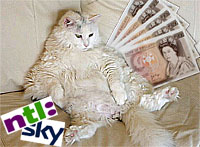 Britain’s biggest cable operator, NTL, has agreed to shell out an eye-watering $6 billion (~£3.42bn, ~€5bn) for Telewest Global.
Britain’s biggest cable operator, NTL, has agreed to shell out an eye-watering $6 billion (~£3.42bn, ~€5bn) for Telewest Global.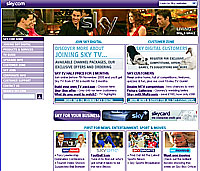 According to a statement – which ends three years of speculation about the merger – Simon Duffy, NTL’s chief executive, will lead the combined company.
According to a statement – which ends three years of speculation about the merger – Simon Duffy, NTL’s chief executive, will lead the combined company.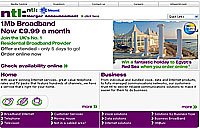 Chairman Cob Stenham can expect his bank balance to increase to the tune of $20m (~£11.4m, ~€16.77m) while chief executive Barry Ellison will no doubt cackle wildly with joy as $17m (~£9.7m, ~€14.25m) rolls into his coffers.
Chairman Cob Stenham can expect his bank balance to increase to the tune of $20m (~£11.4m, ~€16.77m) while chief executive Barry Ellison will no doubt cackle wildly with joy as $17m (~£9.7m, ~€14.25m) rolls into his coffers. The Times have covered Richard Freudenstein, COO of BSkyB, speech at the RTS Cambridge Convention
The Times have covered Richard Freudenstein, COO of BSkyB, speech at the RTS Cambridge Convention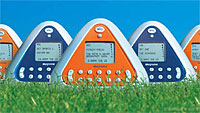 BSkyB has announced The Gnome, a wireless digital receiver gadget that lets Sky subscribers listen to radio (or TV) anywhere around the house.
BSkyB has announced The Gnome, a wireless digital receiver gadget that lets Sky subscribers listen to radio (or TV) anywhere around the house.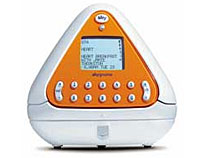 The natty wireless receiver works with all Sky boxes and lets subscribers get an earful of over 80 digital radio channels – as well as the television channels in their Sky package – at no extra charge.
The natty wireless receiver works with all Sky boxes and lets subscribers get an earful of over 80 digital radio channels – as well as the television channels in their Sky package – at no extra charge.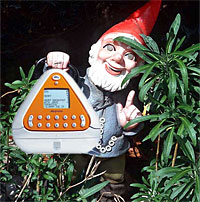 A somewhat mellower Brian Sullivan, BSkyB’s director of customer products and services, observed that the Gnome was a “fun product that adds value and flexibility for Sky’s growing customer base.”
A somewhat mellower Brian Sullivan, BSkyB’s director of customer products and services, observed that the Gnome was a “fun product that adds value and flexibility for Sky’s growing customer base.”